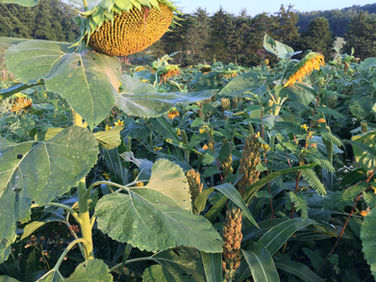
The 4 Core Principles
While soils are complex, taking care of it can be simple. We follow four core principles of soil health:

1. Keep Soil Covered
It's the first step in protecting it from erosion, but also buffers soil temperature, slows rainfall runoff, and aids rainfall infiltration.
.png)
2. Minimize Soil Disturbance
Both physical and chemical. This proactive measure can heal and protect properties of the soil and ultimately enhance the biological component of soil life.

3. Maximize Living Roots
Doing this longer throughout the year fuels biological activity and contributes to improved soil structure.

4. Energize with Diversity
Use different crop species and integrate livestock where possible for specific purposes to enhance chemical, physical and/or biological aspects of the soil. It improves the whole system.
Learn more about the four principles:
There are many ways to apply the four principles:
And don't forget the 5 priorities of soil health management
Visit our local technical assistance partners to learn more:
Depending on your needs and interest in technical and educational assistance, there are a number of Coalition partners at the federal, state, and local levels that can provide assistance and guidance on a wide range of agriculture, natural resources, land management, and conservation planning topics. The interactive map below provides addresses and contact information so you can learn more about their services and technical assistance.
Natural Resources Conservation Services (NRCS) is a federal agency of the United States Department of Agriculture that provides technical assistance and conservation planning to farmers, ranchers, and other private landowners and managers wanting to improve and protect natural resources on their farms or land
Soil and Water Conservation Districts (SWCDs) are political subdivisions of the state and work closely with the Virginia Department of Conservation and Recreation (DCR) to develop comprehensive programs and plans to conserve soil resources, control and prevent soil erosion, prevent floods, and conserve, develop, utilize and dispose of water at a county or multi-county basis.
Virginia Cooperative Extension (VCE), a partnership of Virginia Tech and Virginia State University, provides resources and educational outreach to the Commonwealth of Virginia’s more than seven million residents in the areas of agriculture and natural resources, family and consumer sciences, community viability, and 4-H youth development.
Virginia Tech Agriculture Research and Extension Centers (ARECs), as part of Virginia's Agriculture Experiment Station system, conduct research on food and fiber systems, their impact on the environment, and their relation to the future needs of Virginia, the nation, and the world.
See all partners of the Virginia Soil Health Coalition here
Resources

















